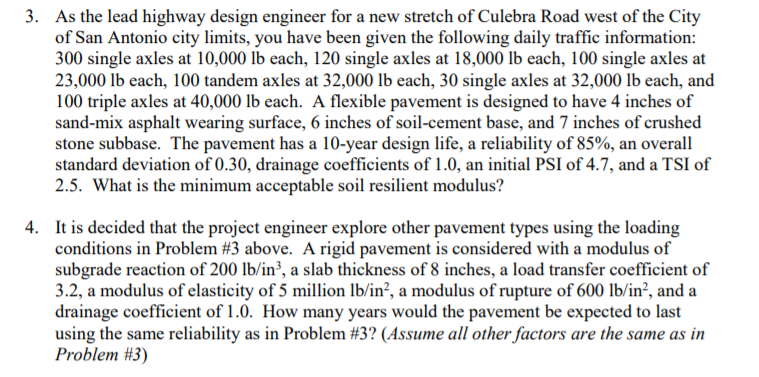Answered step by step
Verified Expert Solution
Question
1 Approved Answer
I only need help with #4. Thanks! 3. As the lead highway design engineer for a new stretch of Culebra Road west of the City

I only need help with #4. Thanks!
3. As the lead highway design engineer for a new stretch of Culebra Road west of the City of San Antonio city limits, you have been given the following daily traffic information: 300 single axles at 10,000 lb each, 120 single axles at 18,000 lb each, 100 single axles at 23,000 lb each, 100 tandem axles at 32,000 lb each, 30 single axles at 32,000 lb each, and 100 triple axles at 40,000 lb each. A flexible pavement is designed to have 4 inches of sand-mix asphalt wearing surface, 6 inches of soil-cement base, and 7 inches of crushed stone subbase. The pavement has a 10-year design life, a reliability of 85%, an overall standard deviation of 0.30, drainage coefficients of 1.0, an initial PSI of 4.7, and a TSI of 2.5. What is the minimum acceptable soil resilient modulus? 4. It is decided that the project engineer explore other pavement types using the loading conditions in Problem #3 above. A rigid pavement is considered with a modulus of subgrade reaction of 200 lb/in?, a slab thickness of 8 inches, a load transfer coefficient of 3.2, a modulus of elasticity of 5 million lb/in?, a modulus of rupture of 600 lb/in?, and a drainage coefficient of 1.0. How many years would the pavement be expected to last using the same reliability as in Problem #3? (Assume all other factors are the same as in Problem #3) 3. As the lead highway design engineer for a new stretch of Culebra Road west of the City of San Antonio city limits, you have been given the following daily traffic information: 300 single axles at 10,000 lb each, 120 single axles at 18,000 lb each, 100 single axles at 23,000 lb each, 100 tandem axles at 32,000 lb each, 30 single axles at 32,000 lb each, and 100 triple axles at 40,000 lb each. A flexible pavement is designed to have 4 inches of sand-mix asphalt wearing surface, 6 inches of soil-cement base, and 7 inches of crushed stone subbase. The pavement has a 10-year design life, a reliability of 85%, an overall standard deviation of 0.30, drainage coefficients of 1.0, an initial PSI of 4.7, and a TSI of 2.5. What is the minimum acceptable soil resilient modulus? 4. It is decided that the project engineer explore other pavement types using the loading conditions in Problem #3 above. A rigid pavement is considered with a modulus of subgrade reaction of 200 lb/in?, a slab thickness of 8 inches, a load transfer coefficient of 3.2, a modulus of elasticity of 5 million lb/in?, a modulus of rupture of 600 lb/in?, and a drainage coefficient of 1.0. How many years would the pavement be expected to last using the same reliability as in Problem #3? (Assume all other factors are the same as in Problem #3)Step by Step Solution
There are 3 Steps involved in it
Step: 1

Get Instant Access to Expert-Tailored Solutions
See step-by-step solutions with expert insights and AI powered tools for academic success
Step: 2

Step: 3

Ace Your Homework with AI
Get the answers you need in no time with our AI-driven, step-by-step assistance
Get Started


